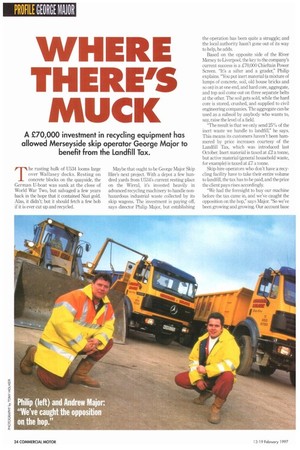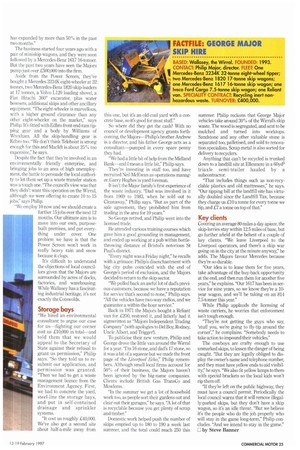WHERE
Page 26

Page 27

If you've noticed an error in this article please click here to report it so we can fix it.
THERE'S MUCK
A E70,000 investment in recycling equipment has allowed Merseyside skip operator George Major to benefit from the Landfill Tax.
The rusting hulk of U534 looms large over Wallasey docks. Resting on concrete blocks on the quayside, the German U-boat was sunk at the close of World War Two, but salvaged a few years back in the hope that it contained Nazi gold. Alas, it didn't; but it should fetch a few bob if it is ever cut up and recycled.
Maybe that ought to be George Major Skip Hire's next project. With a depot a few hundred yards from U534's current resting place on the Wirral, it's invested heavily in advanced recycling machinery to handle nonhazardous industrial waste collected by its skip wagons. The investment is paying off, says director Philip Major, but establishing the operation has been quite a struggle; and the local authority hasn't gone out of its way to help, he adds.
Based on the opposite side of the River Mersey to Liverpool, the key to the company's current success is a £70,000 Chieftain Power Screen. "It's a sifter and a grader: Philip explains. "You put inert material (a mixture of lumps of concrete, soil, old house bricks and so on) in at one end, and hard core, aggregate, and top soil come out on three separate belts at the other. The soil gets sold, while the hard core is stored, crushed, and supplied to civil engineering companies. The aggregate can be used as a subsoil by anybody who wants to, say, raise the level of a field.
"The result is that we only send 25% of the inert waste we handle to landfill," he says. This means its customers haven't been hammered by price increases courtesy of the Landfill Tax, which was introduced last October. Inert material is taxed at £2 a tonne, but active material (general household waste, for example) is taxed at £7 a tonne.
Skip-hire operators who don't have a recycling facility have to take their entire volume to landfill, the tax has to be paid, and the price the client pays rises accordingly.
"We had the foresight to buy our machine before the tax came in, and we've caught the opposition on the hop," says Major. "So we've been growing and growing. Our account base has expanded by more than 50% in the past two months."
The business started four years ago with a pair of min iskip wagons, and they were soon followed by a Mercedes-Benz 1617 16-tonner. But the past two years have seen the Majors pump just over £500,000 into the firm.
Aside from the Power Screen, they've bought a Mercedes 3234K eight-wheeler at 32 tonnes, two Mercedes-Benz 1820 skip-loaders at 17 tonnes, a Volvo L120 loading shovel, a Fiat Hitachi 3600 excavator, plus water bowsers, additional skips and other ancillary equipment. "The eight-wheeler is marvellous, with a higher ground clearance than any other eight-wheeler on the market," says Philip. It's fitted with Edbro front-end-ram tipping gear and a body by Williams of Wrexham. All the skip-handling gear is Eflbro too. "We don't think Telehoist is strong enough for this and Maclift is about 25% too expensive," he says.
Despite the fact that they're involved in an environmentally friendly enterprise, and bringing jobs to an area of high unemployment, the battle to persuade the local authority to let them set up a waste transfer station was a tough one. "The council's view was that they didn't want this operation on the Wirral, although we were offering to create 10 to 15 jobs," says Philip.
"We employ 10 now and we should create a further 15 jobs over the next 12 months. Our ultimate aim is to move into our own, purposebuilt premises, and put everything under cover. One problem we have is that the Power Screen won't work in really heavy rain and snow because it clogs.
It's difficult to understand the objections of local councillors given that the Majors are surrounded by acres of docks, factories, and warehousing. While Wallasey has a fascinating industrial heritage, it's not exactly the Cotswolds.
Storage bays
"We hired an environmental consultant to argue our case for us—fighting our corner cost us £10,000 in total—and told them that we would appeal to the Secretary of State against their refusal to grant us permission," Philip says. "So they told us to resubmit our application, and permission was granted. "Then we had to get a waste management licence from the Environment Agency. First, we had to concrete the yard, steel-line the storage bays, and put in self-contained drainage and sprinkler systems.
"It cost us roughly £40,000. We've also got a second site about half-a-mile away from this one, but it's an old coal yard with a concrete base, so it's good for most stuff."
So where did they get the cash? With no council or development agency grant; forthcoming, the Majors—Philip's brother Andrew is a director, and his father George acts as a consultant—pumped in every spare penny they had.
"We had a little bit of help from the Midland Bank—and I mean a little bit," Philip says.
They're investing in staff too, and have recruited Neil McEwan as operations manager. Garry Hughes is yard foreman.
It isn't the Major family's first experience of the waste industry. "Dad was involved in it from 1969 to 1983, when he sold out to Cleanaway," Philip says. "But as part of the sale agreement, they prohibited him from trading in the area for 10 years."
So George retired, and Philip went into the licensed trade.
He attended various training courses which gave him a good grounding in management, and ended up working at a pub within bottlethrowing distance of Bristol's notorious St Paul's district.
"Every night was a Friday night," he recalls with a grimace. Philip's disenchantment with big city pubs coincided with the end of George's period of exclusion, and the Majors decided to return to the skip sector.
"We pulled back an awful lot of dad's previous customers, because we have a reputation for service that's second to none," Philip says. "All the vehicles have two-way radios, and we guarantee a within-the-hour service."
Back in 1971 the Majors bought a Reliant van for £200, restored it, and latterly had it signwritten as "Majors Independent Trading Company" (with apologies to Del Boy, Rodney, Uncle Albert, and Trigger!).
To publicise their new venture, Philip and George drove the little van around the Wirral for a year. "I'm 16 stone, and dad's 17 stone, so it was a bit of a squeeze but we made the front page of the Liverpool Echo," Philip remembers. Although small local firms account for 50% of their business, the Majors haven't been ignored by the big-name companies. Clients include British Gas TransCo and Mowlems.
"In the summer we get a lot of household work too, as people sort their gardens out and clear out their garages," he says. "A lot of that is recyclable because you get plenty of scrap and timber."
Domestic work helped push the number of skips emptied up to 180 to 190 a week last summer, and the total could reach 250 this summer. Philip reckons that George Major vehicles take around 30% of the Wirral's skip waste. The wood is segregated, and sent to be mulched and turned into worktops. Sandstone and any other valuable stone is separated too, palletised, and sold to renovation specialists. Scrap metal is also sorted for delivery to recyclers.
Anything that can't be recycled is trunked down to a landfill site at Ellesmere in a 60yd3 triaxle semi-trailer hauled by a subcontractor.
"That includes things such as non-recyclable plastics and old mattresses," he says. "Our tipping bill at the landfill site has virtually doubled since the Landfill Tax, because they charge us £10 a tonne for every tonne we tip, and £7 a tonne on top of that"
Key clients
Covering an average 80 miles a day apiece, the skip-lorries stay within 12.5 miles of base, but go further afield at the behest of a couple of key clients. "We leave Liverpool to the Liverpool operators, and there's a skip war going on in the city at the minute anyway," he adds. The Majors favour Mercedes because they're so durable.
"Our idea is to lease them for five years, take advantage of the buy-back opportunity at the end, and then run them for another five years," he explains. "Our 1617 has been in service for nine years, so we know they're a 10year wagon, and we'll be taking on an 814 7.5-tonner this year."
While Philip applauds the licensing of waste carriers, he worries that enforcement isn't tough enough.
"They're not getting the guys who say, 'stuff you, we're going to fly-tip around the corner'," he complains. "Somebody needs to take action to impound their vehicles."
The cowboys are crafty enough to use unmarked skips, to lessen the danger of being caught. "But they are legally obliged to display the owner's name and telephone number, and they must have yellow ends to aid visibility," he says. "We also fit yellow lamps to them with special brackets so the local kids won't rip them off.
"If they're left on the public highway, they must have a council permit. Periodically the local council warns that it will remove illegally-parked skips, but they don't have a skip wagon, so it's an idle threat. "But we believe it's the people who do the job properly who will stay in the game long-term," Philip concludes. "And we intend to stay in the game." 0 by Steve Banner












































































































